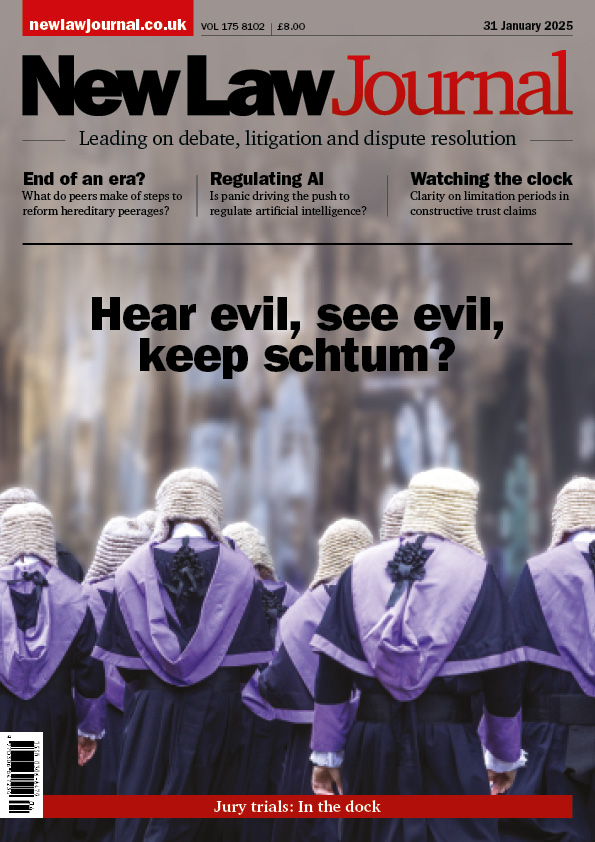THIS ISSUE

Retired judge Dr Victoria McCloud shares her thoughts regarding judicial ‘leadership’, social media guidance and the Judicial Conduct Investigations Office, in this week’s NLJ.
Faced with an unwieldy and ever-rising backlog of cases at the Crown Court, the Ministry of Justice is considering introducing an ‘intermediate tier’ and has put Sir Brian Leveson in charge of a review. In this week’s NLJ, Charles Kuhn, partner at Clyde & Co, examines the possibilities, the potential savings and the impact on justice.
Artificial intelligence (AI) technology may be developing fast but—contrary to popular opinion—the ’panicked rush to legislation’ to regulate it is not necessary, writes Ian McDougall, president of the LexisNexis Rule of Law Foundation & adjunct professor, IE University Law School, in this week’s NLJ.
The responsibilities of paralegals have expanded considerably, as have their career options, Amanda Hamilton, Patron of the National Association of Licensed Paralegals, writes in this week’s NLJ. Some use the experience as a stepping stone into a career as solicitor or barrister, while others develop a specialism in a particular area.
Former district judge Stephen Gold covers a recent landlord and tenant case that was leapfrogged to the Court of Appeal due to its importance, in this week’s NLJ. The case, Switaj v McClenaghan, concerns a check-out fee.
Retired judge Victoria McCloud gives a personal analysis of the implications of new restrictions on judges’ freedom of speech in England & Wales
What will be the verdict on replacing juries with an intermediate tier? Charles Kuhn examines the evidence
Imogen Dodds & Jamie Sutherland consider a Hong Kong case that gives clarity on limitation periods in constructive trust claims
What do the peers make of the Bill seeking to reform hereditary peerage? Neil Parpworth reports back from the House of Lords
Does the Human Rights Act 1998 undermine parliamentary sovereignty? A recent Policy Exchange paper argues that it does. Nicholas Dobson explores the issues
MOVERS & SHAKERS

Jackson Lees Group—Jannina Barker, Laura Beattie & Catherine McCrindle
Firm promotes senior associate and team leader as wills, trusts and probate team expands

Asserson—Michael Francos-Downs
Manchester real estate finance practice welcomes legal director

McCarthy Denning—Harvey Knight & Martin Sandler
Financial services and regulatory offering boosted by partner hires
NEWS
The cab-rank rule remains a bulwark of the rule of law, yet lawyers are increasingly judged by their clients’ causes. Writing in NLJ this week, Ian McDougall, president of the LexisNexis Rule of Law Foundation, warns that conflating representation with endorsement is a ‘clear and present danger’
Holiday lets may promise easy returns, but restrictive covenants can swiftly scupper plans. Writing in NLJ this week, Andrew Francis of Serle Court recounts how covenants limiting use to a ‘private dwelling house’ or ‘private residence’ have repeatedly defeated short-term letting schemes
Artificial intelligence (AI) is already embedded in the civil courts, but regulation lags behind practice. Writing in NLJ this week, Ben Roe of Baker McKenzie charts a landscape where AI assists with transcription, case management and document handling, yet raises acute concerns over evidence, advocacy and even judgment-writing
The Supreme Court has drawn a firm line under branding creativity in regulated markets. In Dairy UK Ltd v Oatly AB, it ruled that Oatly’s ‘post-milk generation’ trade mark unlawfully deployed a protected dairy designation. In NLJ this week, Asima Rana of DWF explains that the court prioritised ‘regulatory clarity over creative branding choices’, holding that ‘designation’ extends beyond product names to marketing slogans
From cat fouling to Part 36 brinkmanship, the latest 'Civil way' round-up is a reminder that procedural skirmishes can have sharp teeth. NLJ columnist Stephen Gold ranges across recent decisions with his customary wit







